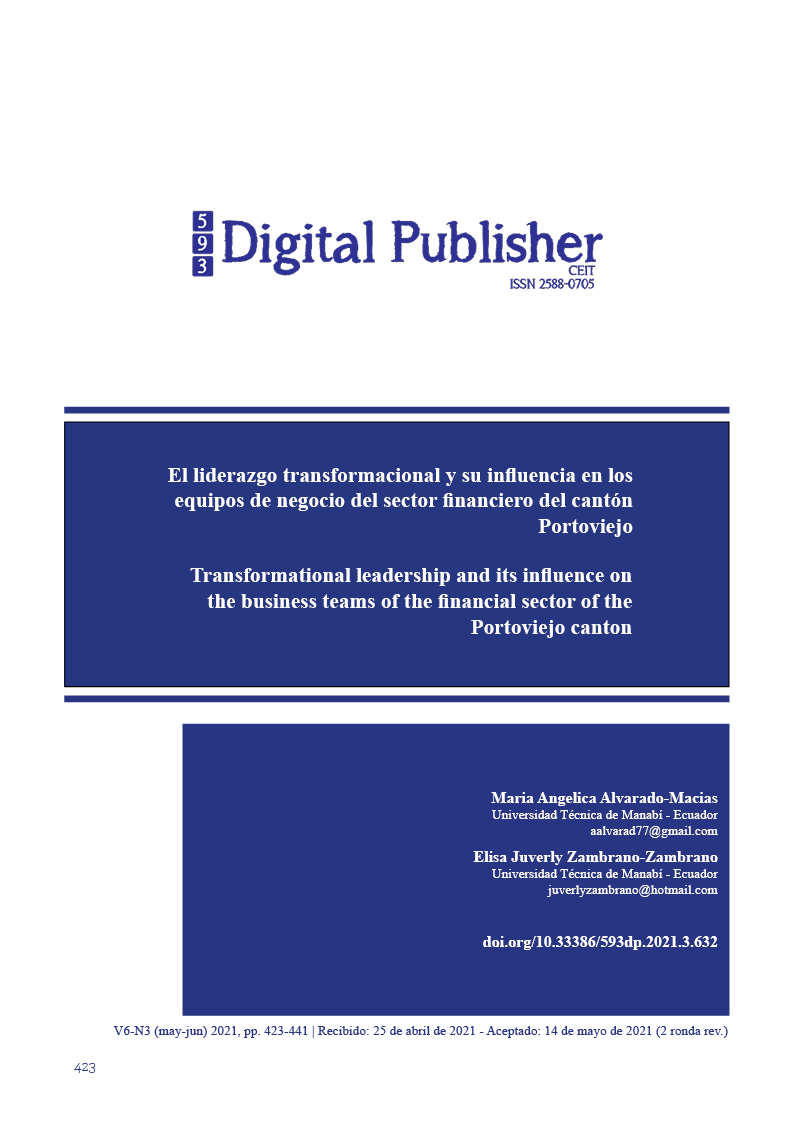El Transformational leadership and its influence on the business teams of the financial sector of the Portoviejo canton
Main Article Content
Abstract
The research allowed to determine the existence of leadership in the gerent of the financial system of the canton Portoviejo, obtaining the following results that the transformational style prevails by 90% and with a higher percentage in the female gender among the respondents while the transactional one obtained 40% and Laissez 30%, which demonstrated the very close relationship that exists between leadership and culture of high commitment where all the members of the team are focused on achieving extraordinary things , achieving in a very firm and subtle way that the subordinate constantly questions what more they can do for the organization.
Downloads
Article Details

This work is licensed under a Creative Commons Attribution-NonCommercial-ShareAlike 4.0 International License.
1. Derechos de autor
Las obras que se publican en 593 Digital Publisher CEIT están sujetas a los siguientes términos:
1.1. 593 Digital Publisher CEIT, conserva los derechos patrimoniales (copyright) de las obras publicadas, favorece y permite la reutilización de las mismas bajo la licencia Licencia Creative Commons 4.0 de Reconocimiento-NoComercial-CompartirIgual 4.0, por lo cual se pueden copiar, usar, difundir, transmitir y exponer públicamente, siempre que:
1.1.a. Se cite la autoría y fuente original de su publicación (revista, editorial, URL).
1.1.b. No se usen para fines comerciales u onerosos.
1.1.c. Se mencione la existencia y especificaciones de esta licencia de uso.
References
Arias, F. (2014). El proyecto de Investigacion. Introduccion a la metodologia cientifica . Caracas: Episteme C A .
Arteaga y Ramon. (2009). Liderazgo resonante segun genero. Multiciencias, 16, 167.
Asencio, A. D. (2020). Trabajo en equipo. Madrid: Editorial Elearning S.L.
Avolio, B.J. y Bass, B.M. . (2004). Multifactor Leadership Questionnaire. Mind Garden.
Bass, Bernard y Avolio, Bruce. (2006). Man.ual for the Multifactor leadership questionnaire Consulting Psychologist Press. Estados Unidos: Palo Alto.
Bolivar. (1997). Liderazgo, mejora y centros educativos. UNED.
Bracho Parra, Otilia; García Guiliany, Jesús. (2013). Algunas consideraciones teóricas sobre el liderazgo transformacional. Telos, 166.
Cabero,J., & Infante, A. (2014). Empleo del metodo Delphi y su empleo en la investigacion en comunicacion y educacion. Revista Electronica de tecnologia educativa, (48), 1-16.
Carballo, A; Priego, H y Avalos, M. (2015). Clima organizacional y satisfacción laboral en el personal operativo federal del programa caravanas de la salud en Tabasco, Mexico. Hitos de Ciencias Economico Administrativas, 44.
Cortes, A. (2004). Estilos de liderazgo y motivacion laboral en el ambiente educativo. Revista Ciencias Sociales, 204.
Cristina, F. (2017). Liderazgo transformacional y transaccional. Revista Venezolana de Gerencia, 59.
Drucker, P. (2016). El liderazgo que marca la diferencia. New Yersey: Profit.
F, M. (2008). El metodo Delphi, prospectiva en ciencias sociales a traves del analisis de un caso practico. Revista EAN, (64) 31-54.
Feliberto Martins Pestana, A. J. (2009). Liderazgo Transformacional y gestión educativa . Revista electronica , 2.
Fernandez Santiago, Cordova Alejandro y Cordero Jose. (2002). Estadistica descriptiva. Madrid: 2002.
Garcia, M & Suarez , M. (2013). El metodo Delphi para la consulta a expertos en la investigacion cientifica. Revista Cubana de salud publica, 39 (2).
Garcia, V.J.; Romerosa, M.M.; LLorens. F.J. (2007). Liderazgo transformacional: Influencia en la vision compartida ,aprendizaje. innovacion y resultado organizativo. Revista Europea de Direccion y Economia de la Empresa.
Hayes, N. (2003). Direccion de equipos de trabajo. Madrid: Thomson Paraninfo, S.A.
Hechos y cifras: Empoderamiento económico. (02 de 2015). Obtenido de ONU MUJERES: https://www.unwomen.org/es/what-we-do/economic-empowerment/facts-and-figures
Hernandez Sampieri, R. F. (2014). Metodologia de la investigacion. Mc Graw Hill.
Jimenez, Gomez y Quinteros. (2019). El liderazgo transformacional y su influencia en los atributos de los seguidores en la MIpymes mexicanas. Estudios gerenciales.
Landeta, J. (2002). El metodo Delphi: una tecnica de prevision del futuro. Barcelona: Ediciones Ariel.
Malpica, Rossell y Hoffmann. (2014). Equipos de trabajo de alto desmpeño. Observatorio Laboral Revista Venezolana, 71.
Mendoza Torres, Martha Ruth; Ortiz Riaga, Carolina. (2006). El Liderazgo Transformacional, Dimensiones e Impacto en la Cultura Organizacional y Eficacia de las empresas. Revista Facultad de Ciencias Económicas: Investigación y Reflexión, 118-134.
Molero Fernando, Recio Patricia y Cuadrado Isabel. (2010). Liderazgo transformacional y liderazgo transaccional: un análisisde la estructura factorial del Multifactor Leadership Questionnaire (MLQ) en una muestra española. Psicothema, 500.
Mondragon, M. (2014). Uso de la correlación de spearman en un estudio. Iberoamericana, 100.
Morales, X. M. (2008). La estructura y naturaleza del capotal social en las aglomeraciones territoriales de empresas. Madrid: Fundacion BBVA.
Okoli, C.& Pawlowski, S.D. (2004). The delphi method as a research tool: an example, design considerations and apllications. Information & Management, 42 (1), 15-29.
Palomo, M. (2008). Liderazgo y Motivacion de equipos de trabajo. Madrid: ESIC EDITORIAL.
Quero, M. (2010). Confiabilidad y coeficiente Alpha de Cronbach. Telos, 250.
Reza, J. C. (2005). Equipos de trabajo efectivos y altamente productivos. Mexico: Panorama Editorial S.A.
Salazar, M. (2006). El liderazgp transformacional, modelos para organizaciones educativas que aprenden. Unirevista, 5.
Sampieri, R. (2006). Analisis de datos cuantitativos. Obtenido de www.ciberinnova.edu.co
Supeintendencia de Bancos. (2021). Obtenido de Calificación de Riesgo Instituciones Financieras 2019: https://www.superbancos.gob.ec/bancos/calificacion-de-riesgo-instituciones-financieras-2019/
Torres, S.P.G, Aguilar, J.D.G., Trujillo, L.B., Caraguay, V.C.E. y Lorenzo, A.F. (2017). Estrucutura organizacional y estilos de liderazgo en Cooperativas de ahorro y credito de Pichincha. COODES, 19-31.
Valarezo, C. (27 de 05 de 2019). Influencia de los estilos de liderazgo en el desempeño financiero de las Cooperativas de Ahorro y Credito en la ciudad de Loja. Loja, Loja, Ecuador.
Valentin Nadina, Rivas Luis. (2006). Los estilos de liderazgo en las organizaciones de servicios
Valentin Nadina, Rivas Luis. (2006). Los estilos de liderazgo en las organizaciones de servicios



